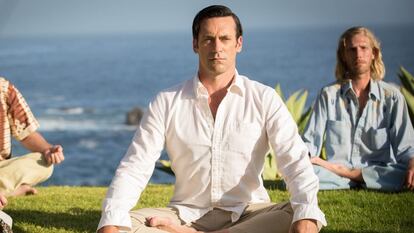How to write the perfect series finale
The last episode of a television show makes up most of the memory a viewer will have of it. EL PAÍS speaks to several scriptwriters to analyze the process

Even today, there are still fans of Lost who hold a grudge against those responsible for scripting its ending. A flood of dissatisfied fans ran online petitions to demand a rewrite of the final season of Game of Thrones. Dexter’s finale received so much criticism that the series returned years later to try to fix the mess. Hundreds of enraged viewers called HBO on the night the final episode of The Sopranos aired, thinking that the showrunners’ chosen ending was in fact the broadcast being cut off prematurely.
A finale that doesn’t live up to viewers’ expectations can blemish a series forever, while a well-received ending is seen as the perfect curtain call for a great story. Without too many spoilers, it’s easy to pick out a few of the latter. Don Draper meditating and smiling as he has a great new idea; the resounding end to Walter White’s descent into hell; the gaze into the future by the characters of Six Feet Under; an emotional reunion and a leisurely chat in The Leftovers; Monica, Rachel, Phoebe, Ross, Joey, and Chandler’s farewell.
In the space of just a few days, some of the most highly awarded and celebrated series of recent years draw to a close. Friday saw the end of The Marvelous Mrs. Maisel. Monday, May 29, sees Succession and Barry bid farewell and the third season of Ted Lasso will end Wednesday, which will almost certainly be the end of the show in its current guise. Time will tell if their finales live up to the rest of their runs.
Screenwriters know the importance of giving their stories a fitting sendoff. “It’s the icing on the cake, the last memory you leave the viewer. If your story has been good but you haven’t been able to close it well, you generate frustration and leave a bad taste in the mouth that can even haunt you as a creator,” says Jacobo Delgado, script coordinator on what will be the final season of long-running Spanish drama Cuéntame. Esther Martínez Lobato, who has written for series including Money Heist and Spanish crime caper Sky Rojo, agrees: “A good ending leaves a more powerful sensation than the isolated sum of brilliant episodes. The ending has to be as surprising as it is coherent. And for a writer, this is extremely difficult.”
“I think it was [Spanish filmmaker] David Trueba who said that in a movie’s ending you can see the ideology of the story. And the coherence. And that’s likely [the case]. I doubt that always happens in a series, perhaps in a miniseries,” says Carlos Montero, creator of several Spanish television shows. “I think that in many series, the end is not the important aspect, the path is. In others, like Breaking Bad, of course the ending is completely in line with the hero’s journey, in this case with his passage into darkness,” he adds.
In the interconnected world of social networks, screenwriters receive instant feedback from viewers, both good and bad. Are creators now treading carefully so as not to upset fans? “If we did that, we would fail for sure. In fiction you have to go all in, have faith in what you’re doing, and then pray that you haven’t made a mistake,” says Delgado. Montero, meanwhile, confesses that he feels more pressure when presenting the premise than thinking about the ending: “If the viewers make it to the last episode, you’ve already done what you set out to do.” Martínez Lobato says attention to detail is paramount beyond writing an ending: “We scriptwriters have to be cautious scene by scene. Thanks to social networks, they are constantly subject to summary judgment.”
Gema R. Neira, creator of several Spanish shows including Cable Girls, believes that the streaming networks have dampened the effect of reaction: “Before, everyone watched the show on the same day and started to talk about it then, or the following day; there was more impact than now. The fact that now everyone watches shows whenever they want dilutes that feeling.” In this sense, Delgado highlights the merit of Succession: “It has managed to make us watch the series in pre-platform mode, everyone at the same time, an episode every Monday. I’m looking forward to the last one, and in the unlikely event that it turns out to be a dud, I won’t feel cheated. Long-running series are like life itself: the important thing is not so much the final destination, but enjoying the journey. And you have to take your hat off to Succession’s journey.”
Breaking Bad creator Vince Gilligan has said in several interviews that, contrary to what one might think, the journey taken by Walter White and Jesse Pinkman was constructed on the fly, with no previous plan. “It’s good to think in advance where the story is going, but a better way to write television is to be open to possibilities and changes of plans, and to be more flexible with the narrative,” he told EL PAÍS in an interview in 2018. “Few series start with their end in mind,” says Montero. “Those that run for many seasons can be compared to a series of novels; they are created season by season.”
“Having a well thought-out ending before we start writing can put us in a straitjacket,” says Delgado. Martínez Lobato describes a series as “something that grows day by day. Everyone involved in it brings things to the table; they are creators. You have to have the story figured out - especially in certain genres where you have to generate questions and give the right answers - but I don’t mind being surprised by a series’ growth and enjoy the changes.” For her part, Neira prefers to have a lighthouse as a reference point at the end of the journey, a place to head towards. “But always remembering that along the way, often things emerge that improve the story. If it’s a thriller, almost all of us start at the end and then build the puzzle. If it’s a continuity series, you can have a more generic idea and, depending on how many seasons you write, vary it as you go along.”
When asked what they consider the best ending to a series in television history, all of the screenwriters hesitate. Delgado opts for The Leftovers: “Ten minutes with zero action, two characters talking, sitting at a table. On paper, everything that shouldn’t be done, and yet it managed to move me like few endings have.” Neira chooses two: “Because it was surprising, emotional, and more than lived up to the series and has become part of television history, Six Feet Under, which had a fantastic ending. But I really liked Mad Men’s finale, which had all the elements you would expect from the series and is both surprising and recognizable in the references they make. It’s intellectual and funny at the same time.” Montero goes off on a tangent: “Perhaps through occupational habit, I imagine the endings of the series I like before they happen. I know they are good endings when the ones I have thought of are much worse than the ones that air. I hope Succession and The Marvelous Mrs. Maisel don’t live up to the endings I’ve imagined. I’m sure I won’t be disappointed. The disappointment is that they are ending at all.”
Sign up for our weekly newsletter to get more English-language news coverage from EL PAÍS USA Edition
Tu suscripción se está usando en otro dispositivo
¿Quieres añadir otro usuario a tu suscripción?
Si continúas leyendo en este dispositivo, no se podrá leer en el otro.
FlechaTu suscripción se está usando en otro dispositivo y solo puedes acceder a EL PAÍS desde un dispositivo a la vez.
Si quieres compartir tu cuenta, cambia tu suscripción a la modalidad Premium, así podrás añadir otro usuario. Cada uno accederá con su propia cuenta de email, lo que os permitirá personalizar vuestra experiencia en EL PAÍS.
¿Tienes una suscripción de empresa? Accede aquí para contratar más cuentas.
En el caso de no saber quién está usando tu cuenta, te recomendamos cambiar tu contraseña aquí.
Si decides continuar compartiendo tu cuenta, este mensaje se mostrará en tu dispositivo y en el de la otra persona que está usando tu cuenta de forma indefinida, afectando a tu experiencia de lectura. Puedes consultar aquí los términos y condiciones de la suscripción digital.









































